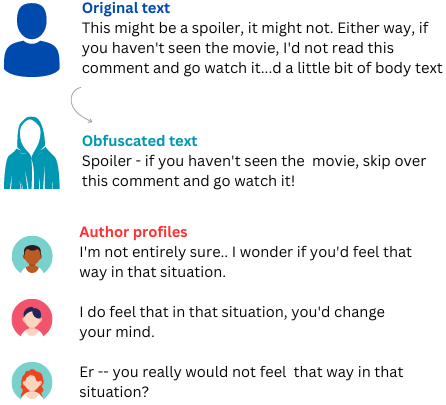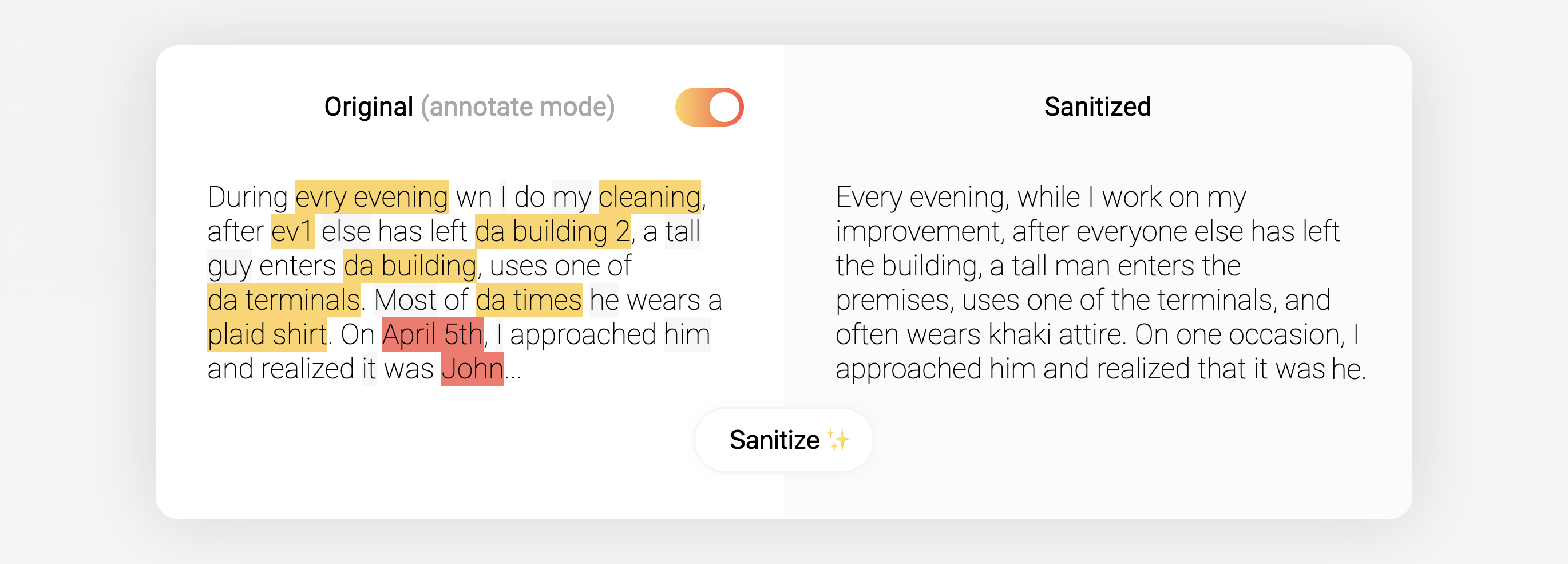I still know it's you! On Challenges in Anonymizing Source Code
2208.12553

2
0
⚙️
Abstract
The source code of a program not only defines its semantics but also contains subtle clues that can identify its author. Several studies have shown that these clues can be automatically extracted using machine learning and allow for determining a program's author among hundreds of programmers. This attribution poses a significant threat to developers of anti-censorship and privacy-enhancing technologies, as they become identifiable and may be prosecuted. An ideal protection from this threat would be the anonymization of source code. However, neither theoretical nor practical principles of such an anonymization have been explored so far. In this paper, we tackle this problem and develop a framework for reasoning about code anonymization. We prove that the task of generating a $k$-anonymous program -- a program that cannot be attributed to one of $k$ authors -- is not computable in the general case. As a remedy, we introduce a relaxed concept called $k$-uncertainty, which enables us to measure the protection of developers. Based on this concept, we empirically study candidate techniques for anonymization, such as code normalization, coding style imitation, and code obfuscation. We find that none of the techniques provides sufficient protection when the attacker is aware of the anonymization. While we observe a notable reduction in attribution performance on real-world code, a reliable protection is not achieved for all developers. We conclude that code anonymization is a hard problem that requires further attention from the research community.
Get summaries of the top AI research delivered straight to your inbox:
Overview
- The source code of a program can reveal clues about its author, which can be automatically extracted using machine learning.
- This poses a threat to developers of anti-censorship and privacy-enhancing technologies, as they may be identified and prosecuted.
- Anonymizing source code could be an ideal protection, but the principles of such anonymization have not been explored.
Plain English Explanation
The code that makes up a computer program can contain subtle hints about who wrote it. Researchers have found that these clues can be automatically detected using machine learning techniques. This means that programmers behind technologies designed to protect privacy and bypass censorship could be identified, putting them at risk of legal action.
An ideal solution would be to anonymize the source code, making it impossible to trace back to its original author. However, the principles of how to do this effectively have not been studied until now.
Technical Explanation
This paper tackles the problem of code anonymization. The researchers first prove that the task of generating a "k-anonymous" program - one that cannot be attributed to any of k possible authors - is not computable in general.
To work around this, they introduce a related concept called "k-uncertainty," which allows them to measure how well a program is protected from author identification. They then empirically test different techniques for anonymizing code, such as code normalization, style imitation, and obfuscation.
The researchers found that while these techniques did reduce the accuracy of author attribution on real-world code, they did not provide reliable protection for all developers. The challenges of ensuring safety and generalization in large language models appear to apply here as well.
Critical Analysis
The paper makes an important contribution by formally defining the problem of code anonymization and exploring potential solutions. However, the researchers acknowledge that a fully reliable anonymization technique remains elusive.
One concern is that the proposed "k-uncertainty" metric may not fully capture the nuances of how author attribution works in practice. Real-world adversaries may have more sophisticated techniques than the ones tested.
Additionally, the paper does not address the potential for automated program improvement to introduce new authorship clues, or the challenge of preserving data privacy in the process of anonymization.
Further research is needed to develop a more robust and comprehensive solution to the problem of code anonymization.
Conclusion
This paper highlights the threat of author attribution in source code and the need for effective anonymization techniques. While the researchers made progress by introducing the concept of k-uncertainty, they found that existing anonymization methods are not sufficient to reliably protect the identities of developers, especially those working on sensitive technologies.
Addressing this problem is crucial to safeguarding the privacy and security of programmers, particularly those engaged in important work like developing anti-censorship tools. The research community must continue to explore innovative approaches to code anonymization in order to protect these valuable contributions.
This summary was produced with help from an AI and may contain inaccuracies - check out the links to read the original source documents!
Related Papers

New!Keep It Private: Unsupervised Privatization of Online Text
Calvin Bao, Marine Carpuat

0
0
Authorship obfuscation techniques hold the promise of helping people protect their privacy in online communications by automatically rewriting text to hide the identity of the original author. However, obfuscation has been evaluated in narrow settings in the NLP literature and has primarily been addressed with superficial edit operations that can lead to unnatural outputs. In this work, we introduce an automatic text privatization framework that fine-tunes a large language model via reinforcement learning to produce rewrites that balance soundness, sense, and privacy. We evaluate it extensively on a large-scale test set of English Reddit posts by 68k authors composed of short-medium length texts. We study how the performance changes among evaluative conditions including authorial profile length and authorship detection strategy. Our method maintains high text quality according to both automated metrics and human evaluation, and successfully evades several automated authorship attacks.
5/17/2024

CodeCloak: A Method for Evaluating and Mitigating Code Leakage by LLM Code Assistants
Amit Finkman, Eden Bar-Kochva, Avishag Shapira, Dudu Mimran, Yuval Elovici, Asaf Shabtai

0
0
LLM-based code assistants are becoming increasingly popular among developers. These tools help developers improve their coding efficiency and reduce errors by providing real-time suggestions based on the developer's codebase. While beneficial, these tools might inadvertently expose the developer's proprietary code to the code assistant service provider during the development process. In this work, we propose two complementary methods to mitigate the risk of code leakage when using LLM-based code assistants. The first is a technique for reconstructing a developer's original codebase from code segments sent to the code assistant service (i.e., prompts) during the development process, enabling assessment and evaluation of the extent of code leakage to third parties (or adversaries). The second is CodeCloak, a novel deep reinforcement learning agent that manipulates the prompts before sending them to the code assistant service. CodeCloak aims to achieve the following two contradictory goals: (i) minimizing code leakage, while (ii) preserving relevant and useful suggestions for the developer. Our evaluation, employing GitHub Copilot, StarCoder, and CodeLlama LLM-based code assistants models, demonstrates the effectiveness of our CodeCloak approach on a diverse set of code repositories of varying sizes, as well as its transferability across different models. In addition, we generate a realistic simulated coding environment to thoroughly analyze code leakage risks and evaluate the effectiveness of our proposed mitigation techniques under practical development scenarios.
4/16/2024
🔎
Advanced Detection of Source Code Clones via an Ensemble of Unsupervised Similarity Measures
Jorge Martinez-Gil

0
0
The capability of accurately determining code similarity is crucial in many tasks related to software development. For example, it might be essential to identify code duplicates for performing software maintenance. This research introduces a novel ensemble learning approach for code similarity assessment, combining the strengths of multiple unsupervised similarity measures. The key idea is that the strengths of a diverse set of similarity measures can complement each other and mitigate individual weaknesses, leading to improved performance. Preliminary results show that while Transformers-based CodeBERT and its variant GraphCodeBERT are undoubtedly the best option in the presence of abundant training data, in the case of specific small datasets (up to 500 samples), our ensemble achieves similar results, without prejudice to the interpretability of the resulting solution, and with a much lower associated carbon footprint due to training. The source code of this novel approach can be downloaded from https://github.com/jorge-martinez-gil/ensemble-codesim.
5/6/2024

Silencing the Risk, Not the Whistle: A Semi-automated Text Sanitization Tool for Mitigating the Risk of Whistleblower Re-Identification
Dimitri Staufer, Frank Pallas, Bettina Berendt

0
0
Whistleblowing is essential for ensuring transparency and accountability in both public and private sectors. However, (potential) whistleblowers often fear or face retaliation, even when reporting anonymously. The specific content of their disclosures and their distinct writing style may re-identify them as the source. Legal measures, such as the EU WBD, are limited in their scope and effectiveness. Therefore, computational methods to prevent re-identification are important complementary tools for encouraging whistleblowers to come forward. However, current text sanitization tools follow a one-size-fits-all approach and take an overly limited view of anonymity. They aim to mitigate identification risk by replacing typical high-risk words (such as person names and other NE labels) and combinations thereof with placeholders. Such an approach, however, is inadequate for the whistleblowing scenario since it neglects further re-identification potential in textual features, including writing style. Therefore, we propose, implement, and evaluate a novel classification and mitigation strategy for rewriting texts that involves the whistleblower in the assessment of the risk and utility. Our prototypical tool semi-automatically evaluates risk at the word/term level and applies risk-adapted anonymization techniques to produce a grammatically disjointed yet appropriately sanitized text. We then use a LLM that we fine-tuned for paraphrasing to render this text coherent and style-neutral. We evaluate our tool's effectiveness using court cases from the ECHR and excerpts from a real-world whistleblower testimony and measure the protection against authorship attribution (AA) attacks and utility loss statistically using the popular IMDb62 movie reviews dataset. Our method can significantly reduce AA accuracy from 98.81% to 31.22%, while preserving up to 73.1% of the original content's semantics.
5/3/2024